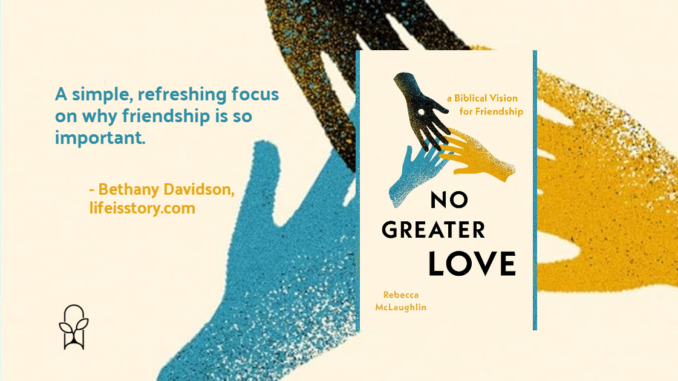
Also by this author: 10 Questions Every Teen Should Ask (and Answer) about Christianity, World on Fire: Walking in the Wisdom of Christ When Everyone’s Fighting About Everything, Is Christmas Unbelievable?: Four Questions Everyone Should Ask about the World's Most Famous Story, Confronting Jesus: 9 Encounters with the Hero of the Gospels, Is Easter Unbelievable?: Four Questions Everyone Should Ask about the Resurrection Story, Is Easter Unbelievable?: Four Questions Everyone Should Ask about the Resurrection Story
Published by Moody Publishers on September 5, 2023
Genres: Non-Fiction, Christian Life
Buy on Amazon
Goodreads

Greater love has no one than this: that he lay down his life for his friends. –John 15:13
Our culture idolizes romance and the love of parents for their children. But Jesus said there was no greater love than sacrificial friendship love. What’s more, He issued a command to His disciples that they live into this kind of love. Christian friendship isn’t just a nice-to-have. It’s vital. But it’s also dangerous.
Friends can pull us up when we’re knocked down, embrace us with their love, and spur us on to follow Jesus better. But friends can also grind us to the ground, exploit, or invite us into sin.
In No Greater Love, Rebecca McLaughlin walks us through the highs and lows of friendship love—a love that’s been neglected and malnourished in our modern world. She draws especially on Jesus in the Gospels and on Paul to show how powerful and precious Christian friendship is and how we can walk through the hurt, loss, and disillusionment that comes from broken friendship trust. Beginning with the words of Jesus on the night he was betrayed and abandoned, she points us to His battle-tested love as the unending source of our best love for one another.
Male or female, single or married, joyful or lamenting, lonely or embraced, we all need friendship love. This book will help us give and receive it in a way that calls us back to Jesus’s commandment: that we love each other just like He loves us.
Friendship is a sadly neglected topic in Western society in general, and in the church. In this book, Rebecca McLaughlin encourages people to pursue friendship and hold it in high regard, and she shares personal examples and practical advice about what different Christian friendships may look like and how to cultivate healthy platonic bonds. At the beginning, McLaughlin explores Jesus’s example of friendship, and she highlights how Jesus’s teachings command deep relationship bonds within the church community, not just the nuclear family. She writes that friendship isn’t an optional add-on for Christians, but should flow from the core of our beliefs.
McLaughlin writes about how important it is to welcome people in the church and cultivate a genuine sense of church family, and she suggests ways that Christians can pursue deeply personal bonds with close friends. She also reflects on the importance of inter-generational and cross-gender friendships, and she engages with some common Christian hang-ups, like the idea that close friendships threaten marriage, or that it is inherently unwise for anyone to be friends with someone they could develop feelings of attraction to. Another chapter deals with when it is appropriate to part ways with a friend, and McLaughlin provides ideas for evaluative questions and steps, warning against the risk of codependency and emotional abuse in some friendships.
I appreciated McLaughlin’s nuanced reflections and thoughtful examples, and I also liked her chapter about being friends with people across lines of religious and political difference. Overall, this book is very gracious and wise, and McLaughlin handles theoretical and practical issues in a thought-provoking way. However, since McLaughlin shares so many personal stories about her own friendships, people’s connection with this book will be somewhat dependent on how much they relate to her. I appreciated her vulnerability and many real-life examples, and I can relate to a number of her experiences, but people who identify with her less may not get as much out of this book, and may wish that she had included a wider variety of examples from other people.
No Greater Love: A Biblical Vision for Friendship is a great book for Christians who want to think more deeply about the role of friendship in their lives. McLaughlin describes the biblical basis for close platonic friendships in a helpful way, and she engages with a variety of practical questions and issues that people may face. I appreciate her personal vulnerability throughout this book, and I enjoyed her insightful reflections and advice for pursuing healthy, God-honoring friendships.
